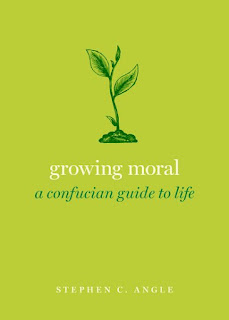 taught at Wesleyan University, where he is now Director of the Fries Center for Global Studies, Mansfield Freeman Professor of East Asian Studies, and Professor of Philosophy. The author of several previous books on Confucianism, Angle has co-directed two NEH Summer Institutes and is a recipient of two Fulbright grants, a Berggruen Fellowship, a Millicent C. McIntosh Fellowship, and a Chiang Ching-Kuo Postdoctoral Research Fellowship. In 2006 he was awarded Wesleyan's Binswanger Prize for Excellence in Teaching.
taught at Wesleyan University, where he is now Director of the Fries Center for Global Studies, Mansfield Freeman Professor of East Asian Studies, and Professor of Philosophy. The author of several previous books on Confucianism, Angle has co-directed two NEH Summer Institutes and is a recipient of two Fulbright grants, a Berggruen Fellowship, a Millicent C. McIntosh Fellowship, and a Chiang Ching-Kuo Postdoctoral Research Fellowship. In 2006 he was awarded Wesleyan's Binswanger Prize for Excellence in Teaching.
Angle applied the “Page 99 Test” to his new book Growing Moral: A Confucian Guide to Life, and reported the following:
The Page 99 Test works. A reader starting Growing Moral on page 99 might flounder initially, since the first line uses unfamiliar terms like “Neo-Confucian” and “heartmind.” But bear with it for a moment, and things fall into place:Learn more about Growing Moral at the Oxford University Press website, and visit the Warp, Weft, and Way website for information about Chinese and Comparative philosophy.…later Neo-Confucian explains it, the heartmind’s having a master is like when the master of the house is at home. When the master is at home things are naturally in order and chaotic outsiders are prevented from entering the house—even without the master’s actively warding them away. Similarly, when one is attuned to the broad significance of any given affair, then “chaos”—that is, selfish concerns—cannot enter one’s heartmind.Readers will note that page 99 is part of a chapter called “Pay Attention,” and here we see that when you’re paying attention in such a way as to be “attuned” to something’s “broad significance,” the result is that selfishness is barred from affecting you.
The rest of the page puts this in terms of “reverential attention”:Reverential attention, then, means to attend to all that one encounters in daily life and to do so from a stance of reverence for interconnected life. We all know people who pay careful attention to their surroundings, but for some reason do so in order to seek out flaws, to nitpick, to undermine. To pay reverential attention is instead to notice and look to reinforce care for life, care for others, and care for the self. We can think of this as looking for harmony. This does not mean that one is actively steering what one sees. Rather, one is looking for harmony in the sense that one is primed to see and react favorably to opportunities for harmony—ways that things fit together well—because even as one is attending single-mindedly to a particular person or thing, in all their distinctness, this will simultaneously include being aware of their interdependence with the entire context.Reverence, harmony, caring, interdependence: these are easy values to grasp, even if one had no idea that they were central to Confucianism, nor that they could be combined in quite this way. The rest of the page makes the relevance of this ideas to our modern lives even more explicit:Skilled managers of any kind of team do this all the time, taking seriously their interactions with each team member while simultaneously noting possible ways in which members can work together even better. Perhaps there’s a way to adjust roles so that each finds their responsibilities even more satisfying, or perhaps there’s some misunderstanding the manager notices that, when cleared up, will help colleagues work together more fluidly.By the end of page 99, we’ve not only made sense of initially unfamiliar ideas, but done so in a way that might have a lesson to teach us in our lives today.
Read in this way, page 99 turns out to be a microcosm of the whole book. It’s meant to feel at least a little strange, at least for those not already familiar with the 3000-year tradition of Confucianism. After all, if all the values and ideas fit perfectly into mental categories you already have, what would there be to gain from considering a Confucian way of life? At the same time, Confucius and his heirs were writing for people who experienced their world and its challenges in fundamentally the same way as other people do, so it should be no shock to discover that their writings resonate with us. Growing Moral tells its readers what to do, if they want to try out a Confucian life, and why such a life is valuable.
--Marshal Zeringue



